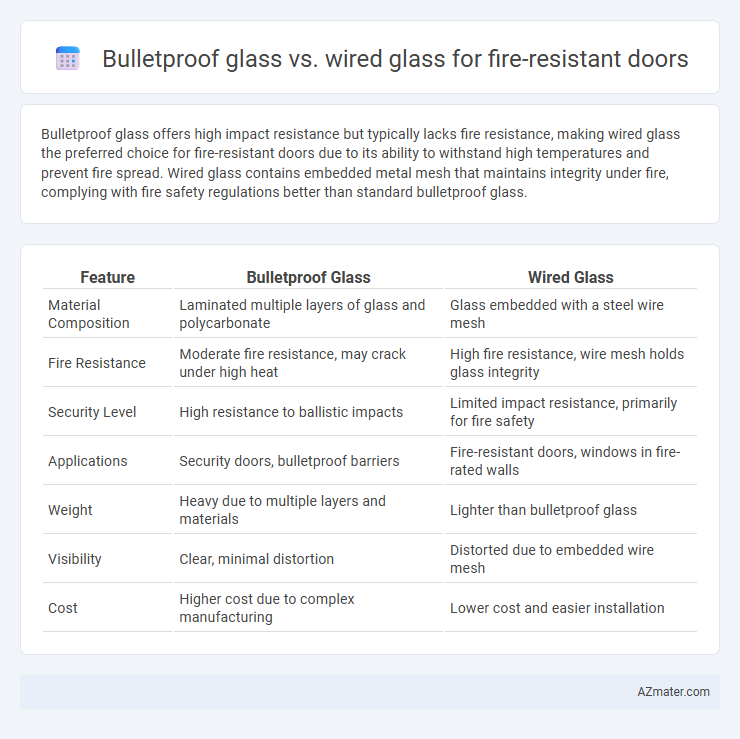Bulletproof glass offers high impact resistance but typically lacks fire resistance, making wired glass the preferred choice for fire-resistant doors due to its ability to withstand high temperatures and prevent fire spread. Wired glass contains embedded metal mesh that maintains integrity under fire, complying with fire safety regulations better than standard bulletproof glass.
Table of Comparison
| Feature | Bulletproof Glass | Wired Glass |
|---|---|---|
| Material Composition | Laminated multiple layers of glass and polycarbonate | Glass embedded with a steel wire mesh |
| Fire Resistance | Moderate fire resistance, may crack under high heat | High fire resistance, wire mesh holds glass integrity |
| Security Level | High resistance to ballistic impacts | Limited impact resistance, primarily for fire safety |
| Applications | Security doors, bulletproof barriers | Fire-resistant doors, windows in fire-rated walls |
| Weight | Heavy due to multiple layers and materials | Lighter than bulletproof glass |
| Visibility | Clear, minimal distortion | Distorted due to embedded wire mesh |
| Cost | Higher cost due to complex manufacturing | Lower cost and easier installation |
Introduction to Fire-Resistant Glass Types
Fire-resistant glass types such as bulletproof glass and wired glass offer distinct safety features for fire-resistant doors, enhancing both protection and visibility. Bulletproof glass provides high impact resistance and maintains clarity under extreme heat, making it ideal for high-security applications with fire safety requirements. Wired glass incorporates embedded wire mesh to prevent shattering during fires, ensuring structural integrity and limited smoke passage while sacrificing some transparency.
What Is Bulletproof Glass?
Bulletproof glass, also known as ballistic glass, is a laminated material designed to withstand high-impact forces, offering enhanced protection against bullets and forced entry. It combines multiple layers of glass and polycarbonate, providing both clarity and durability, making it suitable for fire-resistant doors requiring safety and security. In contrast, wired glass contains embedded metal mesh primarily for fire resistance but lacks the impact resistance and security features of bulletproof glass.
What Is Wired Glass?
Wired glass is a type of fire-resistant glass embedded with a mesh of thin metal wires that provide added strength and help maintain the glass's integrity during exposure to heat. Unlike bulletproof glass designed to withstand high-impact forces, wired glass primarily serves to prevent the spread of fire and smoke by keeping the door intact under extreme temperatures. Its fire-resistive properties meet safety standards, making it a preferred choice for fire-rated doors in commercial buildings and industrial environments.
Fire-Resistance Performance: Bulletproof vs Wired Glass
Bulletproof glass typically offers lower fire-resistance performance compared to wired glass, as it is primarily designed to withstand ballistic impact rather than high temperatures. Wired glass contains embedded metal mesh that helps maintain structural integrity under fire exposure, providing superior resistance against heat and flame penetration. Fire-resistant doors with wired glass can meet stringent fire ratings often required in commercial buildings, whereas bulletproof glass may require additional fireproofing treatments to achieve comparable fire-resistance levels.
Security Features Comparison
Bulletproof glass offers superior protection against forced entry and ballistic threats, making it ideal for high-security fire-resistant doors in sensitive environments. Wired glass, while providing basic fire resistance through embedded steel mesh, is more susceptible to shattering upon impact and offers limited security against break-in attempts. The enhanced durability and impact resistance of bulletproof glass significantly elevate overall security levels compared to wired glass in fire-resistant door applications.
Safety and Impact Resistance
Bulletproof glass offers superior impact resistance by withstanding high-velocity projectiles and significant force, making it ideal for maximizing safety in fire-resistant doors. Wired glass, while providing basic fire protection by preventing the glass from shattering under heat, is prone to brittle failure upon strong impact, compromising safety. Choosing bulletproof glass enhances overall protection by combining fire resistance with robust impact durability, critical for secure environments.
Cost Analysis: Bulletproof vs Wired Glass
Bulletproof glass typically costs significantly more than wired glass, with prices ranging from $50 to $100 per square foot compared to wired glass, which averages $15 to $30 per square foot. The higher price of bulletproof glass reflects its advanced multi-layered construction and superior impact resistance, while wired glass offers basic fire resistance at a lower cost. Choosing between these options for fire-resistant doors involves balancing upfront costs against performance needs and long-term durability.
Aesthetic and Design Considerations
Bulletproof glass offers a sleek, transparent appearance that enhances the modern aesthetic of fire-resistant doors without compromising safety, making it ideal for contemporary architectural designs. Wired glass, featuring embedded metal mesh, provides a distinct, industrial look but can obstruct visibility and limit design versatility. The choice between these materials influences both the visual appeal and the functional integration of fire-resistant doors in various building styles.
Building Codes and Compliance
Bulletproof glass and wired glass differ significantly in meeting fire-resistant door requirements under building codes such as NFPA 80 and UL 10C. Wired glass, commonly used for fire-rated doors, complies with fire-resistance standards by preventing glass breakage during exposure to high temperatures, while bulletproof glass often lacks certified fire rating and may not satisfy fire protection regulations. Compliance with International Building Code (IBC) and local fire safety codes mandates selecting glass materials specifically tested and approved for fire-resistance performance in egress and barrier assemblies.
Choosing the Right Glass for Fire-Resistant Doors
Choosing the right glass for fire-resistant doors involves comparing bulletproof glass and wired glass based on their safety and fire ratings. Wired glass offers excellent heat resistance and prevents fire spread by maintaining structural integrity under high temperatures, meeting strict fire safety codes. Bulletproof glass, while providing superior impact resistance, often lacks high fire endurance, making wired glass the preferred option for fire-resistant door applications where fire protection is paramount.

Infographic: Bulletproof glass vs Wired glass for Fire-resistant door
 azmater.com
azmater.com